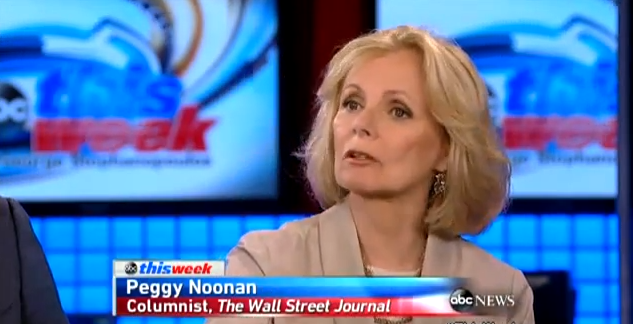 Peggy Noonan is criticizing Hillary Clinton because the publisher's notes for her forthcoming memoir display insufficient modesty. But the publisher's notes for Noonan's own memoir describe her book as a “priceless account” with “timeless relevance” that is “as spirited, sensitive, and thoughtful as Peggy Noonan herself.”
Peggy Noonan is criticizing Hillary Clinton because the publisher's notes for her forthcoming memoir display insufficient modesty. But the publisher's notes for Noonan's own memoir describe her book as a “priceless account” with “timeless relevance” that is “as spirited, sensitive, and thoughtful as Peggy Noonan herself.”
Highlighting recently released publisher's materials for Clinton's Hard Choices, Noonan writes at her Wall Street Journal blog:
The book is being put forward as “a master class in international relations,” which is quite a claim and a rather silly one: a professional diplomat would be slow to make it. But members of political dynasties are not in the modesty business.
In dubiously suggesting that Clinton wrote her own publisher's materials in order to accuse her of immodesty, Noonan ignores the reality that publishers typically offer extravagant praise for their authors and the books they produce. Indeed, Noonan's criticism of Clinton could also be applied to the Journal columnist based on publisher's materials for her own books.
For example, promotional language from Random House for Noonan's 1990 memoir, What I Saw at the Revolution: A Political Life in the Reagan Era, is filled with over-the-top praise of the book's “timeless relevance” and the “spirited, sensitive, and thoughtful” Noonan:
On the hundredth anniversary of Ronald Reagan's birth comes the twentieth-anniversary edition of Peggy Noonan's critically acclaimed bestseller What I Saw at the Revolution, for which she provides a new Preface that demonstrates this book's timeless relevance. As a special assistant to the president, Noonan worked with Ronald Reagan -- and with Vice President George H. W. Bush -- on some of their most memorable speeches. Noonan shows us the world behind the words, and her sharp, vivid portraits of President Reagan and a host of Washington's movers and shakers are rendered in inimitable, witty prose. Her priceless account of what it was like to be a speechwriter among bureaucrats, and a woman in the last bastion of male power, makes this a Washington memoir that breaks the mold--as spirited, sensitive, and thoughtful as Peggy Noonan herself.
Random House's synposis for Noonan's book When Character Was King: A Story Of Ronald Reagan describes her as “renowned for her special insight into Ronald Reagan's history and personality” and praises the book as "[m]arked by incisive wit and elegant prose" that will “enlighten and move readers.”
HarperCollins describes her as “one of our most astute political observers” in materials for The Case Against Hillary Clinton. They also claim her book Patriotic Grace is “written in the pamphleteering tradition of Tom Paine's Common Sense.” Penguin calls her “one of our most eloquent and respected commentators” in materials for John Paul the Great and terms the papal biography “as exceptional as the man it celebrates,” a claim one assumes that Noonan, a Catholic, would not make.
Then there's A Heart, A Cross, And A Flag: America Today, the collection of Noonan's post-9/11 columns published by the Journal's own Simon & Schuster imprint. Materials for the book describe Noonan as “one of America's leading media voices” and state that her “gifts as an observer of the American scene have never been in greater evidence than in these poignant, piercing essays,” which are termed “an apt tribute to everything we lost and learned” during the September 11 attacks.
Those are not the descriptions of someone “in the modesty business.”